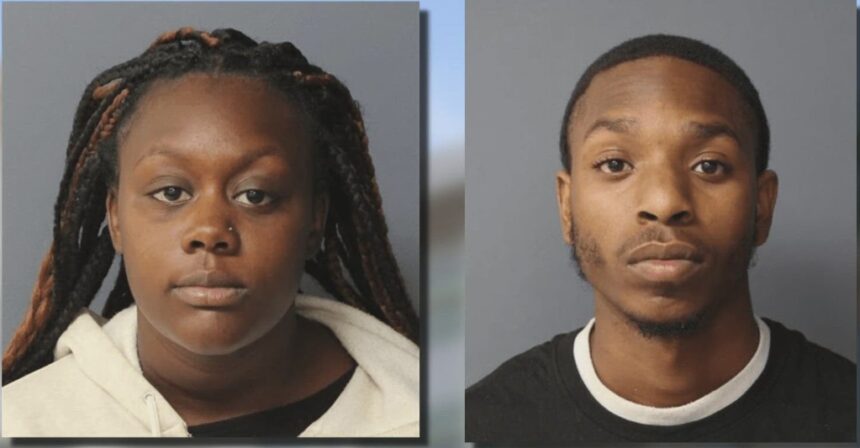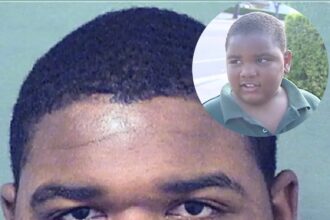The courtroom fell silent as the gavel came down, and for once, the smiles were wiped clean off their faces. Two parents who laughed and joked while their nine-day old daughter lay dead from unspeakable abuse have learned what happens when evil meets justice. This isn’t just another tragic headline. This is a story that will make your blood run cold and remind you that some people should never be trusted with the precious gift of life.
The Day Innocence Died
There are no words easy enough to describe when a life barely begun is snuffed out under cruelty. On May 4, 2024, inside the walls of the Children’s Hospital of The King’s Daughters in Norfolk, Virginia, a nine day old infant named I’ijayah Johnson arrived in distress and did not leave alive. Her injuries were horrific: blunt force trauma to her head and torso, and deep partial thickness burns likely caused by hot liquid to the bottoms of her feet.
Her parents, 24 year old Hilary Johnson II and 22 year old Z’ibreyea S. Parker, now know their fate: decades behind bars, and a legacy they will never outrun.
What Happened: The Evidence & Timeline
Investigators found that I’ijayah was brought in by the couple using public transportation. Hospital staff observed cuts on her head and face, bruises across her back, and severe burns to her feet. The injuries painted a picture so disturbing that medical professionals who see trauma daily were left shaken.
Johnson initially claimed the baby had fallen out of a stroller while he was jogging two days earlier, but forensic evidence did not line up with his story. The medical examiners quickly determined that the injuries could not have occurred the way he described. This wasn’t an accident. This was deliberate, sustained abuse inflicted on a child who had been alive for barely over a week.
According to prosecutors, neither parent sought immediate emergency help. Instead, they attempted home remedies with witch hazel, peroxide, and gauze. Their daughter’s breathing stopped, and only then did they seek hospital care. By the time they arrived, it was already too late. The damage was done, and I’ijayah would never open her eyes again.
The Hospital Scene That Still Haunts
Perhaps one of the most chilling details of this entire nightmare: while checking in at the hospital, the parents reportedly laughed and downplayed the severity of the injuries. One of them claimed they were “not all that serious.” Let that sink in for a moment. Their baby girl was dying, covered in burns and bruises, and they treated it like a minor inconvenience.
Hospital staff and witnesses couldn’t believe what they were seeing. The disconnect between the horrific state of the infant and the casual, almost amused demeanor of her parents was so jarring that multiple people made note of it. This wasn’t shock. This wasn’t grief manifesting in strange ways. This was something far more sinister, a complete absence of empathy or concern for the life they had created and destroyed.
The autopsy declared the cause of death as blunt force trauma to head and torso plus deep partial thickness burns to her feet. These are the kind of injuries that require sustained violence and deliberate infliction of pain. This baby suffered, and she suffered at the hands of the two people who were supposed to protect her above all else.
The Living Conditions: Red Flags Ignored
Another layer of this story that makes it even more heartbreaking: the family’s living situation. Investigators determined that the parents and baby were homeless and living in a tent beneath a highway. A newborn infant, just days old, living under a highway in a tent. The vulnerability, the lack of basic necessities, the exposure to elements and danger, it’s almost impossible to fathom.
I’ijayah’s grandfather, Hilary Johnson Sr., told local outlets that he had expressed concerns about his son’s and Parker’s ability to care for the baby. Those warnings went unheeded. Family members saw the red flags. They knew something wasn’t right. But the system didn’t intervene, and a baby paid the ultimate price.
From a child welfare perspective, this highlights the intersection of homelessness, mental health vulnerability, and parental readiness. Living in a tent under a highway with a newborn? That alone should have triggered social service intervention. The fact that it didn’t invites painful questions about how we protect the most vulnerable among us.
Plea, Sentencing, and Accountability

In early August 2025, Johnson pleaded guilty to second degree murder. Parker entered a guilty plea to child abuse with serious injury. Prosecutors dropped the murder charge for Parker and a separate child abuse count for Johnson under the plea deal.
At sentencing, the weight of their crimes finally caught up with them:
Hilary Johnson II received 19 years in prison, the maximum allowed under the agreement. Z’ibreyea S. Parker was sentenced to 10 years, the maximum for her charge.
Commonwealth’s Attorney Ramin Fatehi stated: “There is no victim more vulnerable than a newborn baby. I’ijayah came into the world in need of love and protection from her mother and father. What she got instead was suffering and death.”
Those words capture everything about this tragedy. A baby who should have been cradled, fed, loved, and protected instead knew only pain, neglect, and violence. Her entire existence on this earth was marked by suffering, and that is something that can never be undone or forgiven.
The Bigger Picture: What This Means
This case is devastating not just for how it ended, but for the many warnings that were missed. When a newborn has bruises, burns, and significant trauma, these are bright red flags that demand immediate action. Instead, delay, neglect, and denial allowed a death to happen.
The legal system’s response sends a clear message: newborns have no voice. When parents ignore danger, that failure counts, even if the precise moments of abuse cannot be individually attributed. The sentences handed down reflect the seriousness of these crimes and the need to protect those who cannot protect themselves.
For the public, it’s a brutal reminder that minimizing injuries, laughing off concerns, and delaying medical care are not harmless decisions. They are choices that can result in death. The phrase “not all that serious” will forever be associated with this case as an example of how denial and evasion of responsibility can have fatal consequences.
Looking Ahead: Reform, Prevention, and Remembrance
What can change? What must change?
Hospitals and social services need tighter protocols when a newborn arrives with significant injuries, especially if parents are homeless or living in unstable conditions. There must be automatic triggers for investigation and intervention when certain red flags appear.
Homelessness and infant care support must be integrated. Tent living with a baby is a danger zone that requires immediate social service involvement. No newborn should be living under a highway without proper shelter, nutrition, and medical care.
Child abuse investigations must ask not just what happened, but why no one intervened earlier. Family members like Hilary Johnson Sr. who expressed concerns should have been heard and their warnings should have prompted action.
Public awareness should shift from blame alone to community vigilance. Neighbors, family, and friends must speak up when they see concerning situations. Silence protects abusers and condemns victims.
The Talk Lounge Take
This case is as raw, as painful, and as real as it gets. The loss of such innocence, the betrayal of trust, and the societal gaps laid bare, this is why we write this. At The Talk Lounge, we don’t just report headlines. We reflect on humanity, accountability, and the scars left behind.
How does someone look at a nine day old baby and feel anything other than overwhelming protectiveness and love? How do two people conspire through action or inaction to torture and kill the most vulnerable, innocent being imaginable? And how do they then laugh about it while that baby dies?
There are no satisfying answers to these questions because the psychology behind such evil is beyond the comprehension of normal, empathetic human beings. What we can take from this tragedy is a renewed commitment to protecting children, believing witnesses who report concerning behavior, and ensuring that our justice system treats crimes against children with the ultimate seriousness they deserve.
Hilary Johnson II and Z’ibreyea S. Parker learned their fates, and while no amount of prison time can bring back I’ijayah Johnson or undo the suffering she endured, at least they will face consequences. At least they will be held accountable. At least the world will remember that this innocent life mattered, even if the people who should have cherished her most treated her as disposable.
I’ijayah may be gone, but her story demands we wake up, act, and do better. Because if we don’t, the next fragile life might not get a voice either. Rest in peace to the baby girl who deserved so much better. The world failed you, but the world will remember you.





